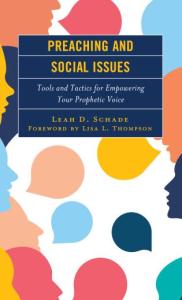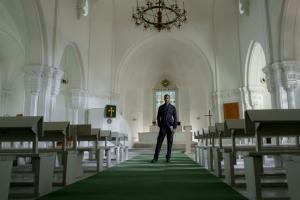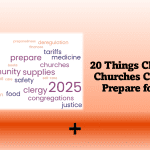I’m seeing a lot of clergy soul-searching following the 2024 U.S. election. Whether you are considering staying in your congregation or leaving, here are things to consider.

Should I stay or should I go now?
I’m a seminary professor and co-founder of a progressive Christian clergy network resisting Christian nationalism. In the weeks following the 2024 U.S. election, I’ve noticed online posts and have been part of conversations with clergy who are soul-searching whether they should stay in their congregations or seek another.
Or even leave ministry altogether.
These are progressive ministers who serve either politically divided congregations or conservative churches. They agonize over having to face Trump voters in their congregation who have rejected the teachings of Jesus in favor of white Christian nationalism.
These ministers preached and taught the gospel faithfully.
They’ve engaged their conservative members in good faith. With courage and diplomacy, they’ve withstood either willful ignorance or blatant sexism, hatred of immigrants, and racial rage expressed in board meetings, Sunday School classes, and parking lot conversations.
Many of them took part in community organizing, hosted forums, and led studies to educate their congregations on the dangers of Christian nationalism. They hoped for the best with the 2024 election but woke up on Nov. 6th facing the worst possible outcome. I see them express a full range of emotions: betrayal, disgust, frustration, anger, despondency, exhaustion, determination.
So now, the post-election clergy soul-searching is underway.
Some ministers have submitted paperwork to their denominational offices to begin the process of finding a new church.
Others are considering early retirement. Or leaving ministry to seek employment in the secular world.
Still others are determined to stick it out and continue their ministry as best they can. These pastors see their role in their congregation and community as even more necessary than before. They are, in fact, feeling energized for the work ahead.
Whatever the fall-out is from this clergy soul-searching, there may be significant shifts in congregations and denominations ahead.
The Great Clergy Realignment?
The mainline Christian church in the U.S. was already knocked back on its heels from the Covid-19 pandemic.
Add to that the political battles over issues that find their way into church conversations, either in the background or through deliberate engagement in preaching and teaching. Topics such as immigration, women’s access to reproductive healthcare, attacks on transgender people, gun violence, and racism can lead to heated conversations in the church or online between members.
Friendships fray. Church attendance diminishes. Offerings decline. Clergy are often blamed.
It’s not surprising, then, that we’ve been seeing the “Great Resignation” among clergy who are feeling beaten up, burned out, and opting to leave ministry.
Now with the results of the 2024 election, there may be even more shifts with clergy and congregations.
One clergyperson in an online forum shared that since Nov. 5, there has been an uptick in the number of ministers who have entered the Search and Call process in their denomination. (This is the process for ministers to move to a new church setting.) While this claim is difficult to verify because denominational offices are tight-lipped when it comes to sharing that kind of information, anecdotal evidence seems to point in the direction of what some call the “Great Realignment” among clergy.
What to do when it all falls apart
I recently wrote a book to help preachers find practical and creative ways to address social issues in sermons.

In one chapter, I noted that despite the desire to maintain harmony in the church, sometimes congregations are too brittle. Tensions are too high. Worldviews are too incompatible. And differences are simply irreconcilable. Unity in these congregations simply is not possible.
When this happens, it raises difficult questions.
- How do we handle those who want to silence the pastor’s voice or stop a congregation from engaging with social issues?
- How do we call out harmful behaviors while remaining pastoral?
- Do we simply preach the gospel and let the chips fall where they may – even if people become angry?
- At what point do we stop fighting to hold onto people who want to leave and prayerfully release them to go with God? And then concentrate on doing the work of the church without them?
I don’t have the answers to these questions, but I believe we need to discuss them. We need to talk about the moral and ethical disconnect between the teachings of Christianity and the behaviors of some Christians. And we need to examine some cherished assumptions openly and forthrightly among our colleagues, in our church leadership meetings, and with our denominational leaders.
One of those assumptions is that we’re supposed to be one big happy family.
Are we really supposed to be one big, happy family?
Parishioners sometimes say things like, “Our church is like a family, so we need to stay together.” In this case, if the preacher addresses sensitive contemporary topics that cause discomfort, a parishioner may accuse the pastor of hurting or dividing the church.
However, it’s worth pointing out that as much as we want the body of Christ to hold together, Jesus warned against the seductive trope of the family. His teaching in Luke 12:49-53 tells us that following him may put us at odds with family members, those we work with, elected leaders, and even fellow Christians.
But it can be especially difficult for congregants who cling to the notion of being a “family” in Christ. As Jesus cautioned: “You will be betrayed even by parents and brothers, by relatives and friends; and they will put some of you to death. You will be hated by all because of my name. But not a hair of your head will perish. By your endurance you will gain your souls” (Luke 21:16-19).
By your endurance you will gain your souls
Endurance is exactly what is required of clergy who dare to speak prophetically. The stress of trying to hold things together takes a tremendous toll on a minister’s physical, emotional, mental, and spiritual health. And sometimes, despite our best efforts to build bridges of understanding, people still leave.
Or they can make the minister want to leave. Or even force them out altogether.
And it can get ugly.
Undoubtedly, there is tremendous pain and loss when people leave a congregation over politics. Most of the time, we keep these kinds of disagreements quiet. Maintaining harmony and peaceful relationships allows us to continue to pack the food bags for the pantry ministry. And serve together on the Altar Guild. And fix the church’s leaky roof. Or engage in pleasant chit-chat over coffee and cookies after the service.
But niceness isn’t going to cut it any longer
Despite our desire for “niceness,” we can no longer ignore the fact that Bible confronts us with values that are counter to what half of U.S. voters assented to in the 2024 election.

The teachings of Jesus and the prophets speak directly against a white supremacist, patriarchal, nationalist, militaristic, xenophobic, homophobic, misogynistic, anti-environmental, and ableist agenda.
Even without mentioning a specific president, a sermon that preaches the values of welcoming the immigrant, obeying the commandment not to murder, lifting up “the least of these,” or valuing Black lives can be mistakenly perceived as promoting a “political agenda.” This indicates that something deeper is going on.
The idols know they are on notice.
When confronted with the teachings of Jesus — with the cross and resurrection — the idols (and those who worship them) bristle because they are being challenged.
Now with the watershed moment of the 2024 election, this country’s anti-Christ idolatry is poised to gain control over all branches of the federal government. And clergy are soul-searching about what this means for their ministry and their vocation.
Threat multipliers
I’ve been working with a team on a longitudinal research project since 2017 surveying clergy and congregations about ministry, preaching, and social issues. We found that there are certain demographic markers that make some preachers more vulnerable to congregational criticism and antagonism than others.
For example, preaching while female is a threat-multiplier.[i]
Female pastors face added complications when preaching prophetically. Not only are they afforded less respect, these pastors also face intimidation and even physical threats more often than their male colleagues. Additionally, female clergy are often placed in smaller churches that can ill-afford the loss of parishioners angry about a justice-oriented sermon. And when these churches are in right-leaning “red zones,” female clergy are at even greater risk of threats and intimidation.
Other vulnerable demographics include: clergy of color in white congregations, queer clergy, clergy who are new to the ministry or to their congregation; progressive clergy in politically “purple” or “red” congregations, and clergy in small, rural congregations.
The post-election clergy soul-searching among these vulnerable pastors is even more intense.
When leaving looks likely
Whether through personal discernment or because of subversive tactics or explicit efforts to oust them, some clergy are edging toward leaving. What do you do if you and the congregation come to a crisis point?
There are two primary things to consider if you are thinking about leaving.
1 – Prioritize your health and wellbeing
How might your mental, physical, emotional, spiritual health be affected? Whether you are forced out of your position or choose to leave, talking with a professional counselor, spiritual director, or therapist with healthy spiritual grounding is a must. The damage of these kinds of conflicts can lead to what some call Post Traumatic Church Syndrome and will follow you to whatever church you next serve. Even if you leave ministry altogether, the trauma will trail you.
So, whether you stay or go, take steps to prioritize your health and wellbeing.
2 – Seek out support
During your time of clergy soul-searching, you’ll need support for your discernment. What care can you count on from your denominational office, pastoral colleagues, spiritual director/counselor, and family or friends?
Now is the time to identify who you can trust to help you process your clergy soul-searching and give you the helpful and practical advice you need.
Remember, the authoritarian powers that are poised to overtake this country are counting on our malaise, feelings of being overwhelmed, and acquiescence to their decisions. So, assemble your go-to people who can listen to you without judgement or shame and help you figure out next steps. Put together a plan for how you will get through the next few weeks and months. And offer mutual support to the people you can count on to help you survive this together.
If you decide to stay

If you are in a congregation that is ready to join you in the work of prophetic ministry, or if you’re willing to tough it out with your politically divided congregation (or have no choice but to do so given your circumstances), here are some things to keep in mind.
* God is still there
What I’ve learned from talking with pastors and congregants is that the presence of conflict does not mean the absence of God. Sometimes a politically divided congregation can move toward healing and the work of activist ministry in ways they had not previously considered. It can happen if obstructive members decide to leave. Or if the lay leaders and governing board choose to come together to support the pastor and the prophetic ministry of the church.
So don’t give up on God who may be working in ways you cannot yet see.
* Shift your energy
If your church cannot be the place where you live out your prophetic vocation, seek out other organizations that do the work to which you feel called. While still ministering in your church, you can shift your energy toward local community groups.
Seek out organizations that are doing the work of protecting the vulnerable, organizing for nonviolent resistance to oppression, and building mutual aid groups and enclaves of support.
* Revisit your ordination vows.
Clergy are not just called to minister to their congregations, but to the community at large. For example, when I was ordained in the Evangelical Lutheran Church in America (ELCA), I took a vow that requires me to preach and teach in accordance with the Holy Scriptures, lead by example, and “give faithful witness in the world through word and deed.”[ii]
In the world – not just in a single church.
Also, look again at your baptismal vows. For example, in the ELCA, we are to “live among God’s faithful people; hear the word of God and share in the Lord’s Supper; proclaim the good news of God in Christ through word and deed; serve all people following the example of Jesus; and strive for justice and peace in all the earth.”[iii]
Serve all people – not just those within our congregation.
Don’t count out the power of the resurrection
Whatever the results of your post-election clergy soul-searching, be assured of the resurrection and new life.
Just imagine what might happen if you were in a church without the naysayers and those who insist that the church should not engage social issues?
What might be possible for your preaching ministry with the muzzle tossed aside?
What if people were excited to learn about how they as a church could take part in the work of God’s Blessed Community?
Might your congregation actually draw in new folks when they see that your church is not just talk, but also action?
Or what if you left ministry altogether to pursue the work of following Jesus within your community, such as at your local library, in your public school, or at your local youth center?
You are not alone
As you engage in this clergy soul-searching, know that you’re not alone. There are many who share your angst and are trying to find their path even as the ground is buckling and the terrain is unstable. Find or create your trusted circle and discover that path together.
At the same time, immerse yourself in self-care and rituals such as prayer, worship, sacraments, journaling, exercise, meditation, and sacred conversations to sustain you.
Trust that the Spirit of the living God will meet you there.
If you like this article or have a story to tell, I’m interested in your thoughts. Feel free to leave me a comment below.

- Are you a preacher in the U.S.? You can help me with my research studying ministry, preaching, and social issues during this unprecedented time by filling out this 15-minute survey.
- Thinking of addressing social issues in a sermon? Preachers can take this 5-minute assessment of their strengths and vulnerabilities here.
- Are you a clergy person looking to connect with other Christian leaders in the work of resisting and disrupting Christian nationalism? Check out the Clergy Emergency League, a group I co-founded in 2020.
Read also:
5 Tips for Clergy to Survive the Riptide of Trump 2.0
Why Did God Allow This to Happen? Post-election Theodicy
It’s Okay to Be A Progressive Christian. Here’s Why.

The Rev. Dr. Leah D. Schade is the Associate Professor of Preaching and Worship at Lexington Theological Seminary in Kentucky and ordained in the ELCA. Dr. Schade does not speak for LTS or the ELCA; her opinions are her own. She is the author of Preaching and Social Issues: Tools and Tactics for Empowering Your Prophetic Voice (Rowman & Littlefield, 2024), Preaching in the Purple Zone: Ministry in the Red-Blue Divide (Rowman & Littlefield, 2019) and Creation-Crisis Preaching: Ecology, Theology, and the Pulpit (Chalice Press, 2015). She is the co-editor of Rooted and Rising: Voices of Courage in a Time of Climate Crisis (Rowman & Littlefield, 2019). Her book, Introduction to Preaching: Scripture, Theology, and Sermon Preparation, was co-authored with Jerry L. Sumney and Emily Askew (Rowman & Littlefield, 2023).
BlueSky: https://bsky.app/profile/leahschade.bsky.social
Facebook: https://www.facebook.com/LeahDSchade/
Amazon: https://www.amazon.com/Leah-D.-Schade/e/B018UH18EQ
[i] An excellent book examining the challenges to women pastors is She: Five Keys to Unlock the Power of Women in Ministry by Karoline Lewis (Nashville, TN: Abingdon Press, 2016).
[ii] “Ordination to the Ministry of Word and Sacrament,” Evangelical Lutheran Worship Occasional Services for the Assembly, Evangelical Lutheran Church in America (Minneapolis: Augsburg Fortress, 2009, 2019).
[iii] “Affirmation of Baptism,” Evangelical Lutheran Worship, Evangelical Lutheran Church in America (Minneapolis, MN: Augsburg Fortress, 2006), 236.













